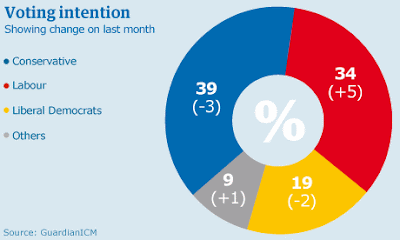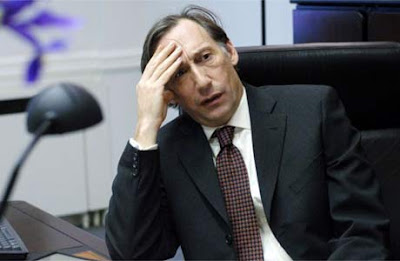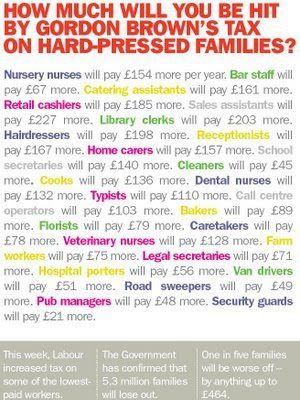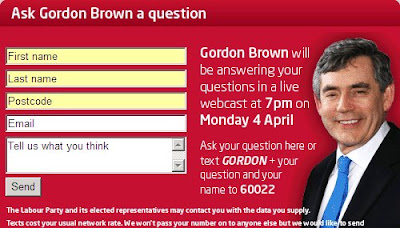Sunday, April 27
Monday, April 21
Rogue Poll?

Sunday, April 20
Fudget
This morning I posted over on Labourhome about the 10p tax issue. Whilst the title of the post might have been a little inflamatory, I stand by my general points.
I'm constantly surprised, however, by how well-meaning Labour supporters seem to oppose any measures which don't appear to be "Labour", even if the effect of those measures is consistent with the principles of the party.
Lump sum transfers (i.e. tax credits) are far better than marginal tax rates at targeting resources towards those on low incomes. Why? Because lower marginal tax rates are a benefit enjoyed by all, whereas tax credits target resources where they are most needed.
If I as a policy maker want to help those on low incomes, then why should I give EVERYBODY a tax cut - even those who can afford to pay. Isn't it better to help those most in need, rather than indiscriminantly handing out tax rebates to prince and pauper alike?
Apparently not, if you read a lot of the comment that has been generated in recent days about the matter.
Sadly, the current argument about the 10p tax rate is caused by the combination of two distinct policies in Gordon Brown's last budget - the removal of the 10p tax rate and the lowering of the basic rate to 20%.
People believe that the one paid for the other. This isn't necessarily strictly true. But the combination of the two policies confuses the issue in peoples' minds.
The government would have an easier job explaining the benefits of the tax credit system over the starting rate had they not abolished the starting rate at the same time as lowering the basic rate.
The Thick(ness) of It

As a fan of the BBC comedy series, The Thick of It, I was both shocked and disappointed when its main star, Chris Langham, was convicted of child pornography offences. As a result of his actions, his career - which had up to that point promised so much - ended abruptly.
So it is with some confusion that I heard the news this week that the Oxford Union will be inviting Chris Langham to speak this term.
On what, exactly? How to commit child pornography offences?
I supported the Union over their decision to invite Nick Griffin and David Irving for a debate on free speech - their attendance had some relevance to the topic under discussion.
However, inviting Chris Langham for a speaker meeting is not, in the same way, defensible.
Current President Ben Tansey suggests that "[The Oxford Union] do not invite speakers for publicity."
He is wrong.
Wednesday, April 9
Is this the issue that will cost Labour the next election?
Today's news that charities Help the Aged and Friends of the Earth are seeking a judicial review application in order to challenge the Government over its fuel poverty strategy didn't seem to set the media alight, but this is a slow-burning issue (excuse the pun) which could seriously threaten Labour's electoral chances at the next election.
Despite official consumer price inflation figures suggesting increases in the general level of prices remain relatively modest - 2.3% in 2007 - fuel prices have been rising at a much faster rate in recent years. For example, electricity price inflation was 8.0% in 2007, down from 21.7% in 2006, and gas price inflation was 7.6% in 2007, down from 31.3% in 2006. In summary, domestic fuel prices rose at over three times the rate of general prices last year, and almost fifteen times as fast the year before.*
Those who lose out from high price inflation on 'necessary' goods (goods that are demand-inelastic) are predominantly those on fixed incomes, such as pensioners and the unemployed.
Rightly, the Government had perviously committed to eradicating fuel poverty by 2010 - this was a legally binding commitment. Yet in their latest annual report on progress towards these targets, the Fuel Poverty Advisory Group (alarmingly) note that:
"The Government appears to have given up on the legally binding 2010 Fuel Poverty Target."In 2007, 2.9m households and 2.3m vulnerable households remained in fuel poverty.
Help the Aged and Friends of the Earth are right that the Government should not give up on its promise to eradicate fuel poverty merely because energy prices continue to rise (if anything, that should be even more reason to meet its target).
However, the Government can ill-afford the additional expenditure necessary to fulfil its legal obligation on fuel poverty. Finances are already tight, and additional taxation in the current uncertain global economic climate is likely to compound the downside risks to the economy.
That will be scant consolation to the hundreds of thousands of pensioners who cannot afford to heat their homes.
If the 2010 target isn't met, and if the Government do little to alleviate current energy inflation, then pensioners (amongst others) will be rightly aggrieved. And what's more, they are the most likely to vent their anger at the ballot box.
The Government ignores its pledge on fuel poverty at its own peril...
*Source: ONS
False hope?
Alastair Darling today hit back at IMF claims that UK growth will slow to 1.6% in 2008. This is a shade lower than the revised Budget predictions of 1.75% to 2.25% growth over the same period.
In the grand scheme of things, 1.6% growth is still remarkable given the current liquidity problems. But the economy is finely poised; it would still be possible for the UK economy to grow by around 1.0-1.3% this year, and yet register a mild technical recession - 2 successive quarters of contraction (which looks increasingly likely to occur in the US).
Which is the right forecast - the IMF's or the Treasury's - is a nigh-on impossible question to answer. As J.K. Galbraith once remarked that: "The only function of economic forecasting is to make astrology look respectable."
Nonetheless, when times are good, Chancellors need not voice 'optimism' about the economy. Economic optimism is a tool only deployed when times are turbulent. Darling's comments this morning make me slightly less optimistic about this year's porspects by virtue of the fact he felt it necessary to make them.
It's a bit like when Football Club Chairman express confidence in their managers who have dragged the club into a relegation fight - far from being a vote of confidence, you fully expect the manager to get sacked...
Tuesday, April 8
Taxing times
There has been a lot of noise in recent days over the abolition of the 10% tax rate, announced in Gordon Brown's final Budget last year. The Conservatives have been attempting to capitalise on the issue and this leaflet, according to Iain Dale, is to be delivered to the consituencies of the Labour MPs who signed an early day motion condemning the tax change.
 Yet the leaflet merely promises to "oppose Labour's plans to double the 10p tax rate". Putting the technical issue of the 'plans' not being 'plans' anymore, this isn't exactly a firm commitment to reverse the decision.
Yet the leaflet merely promises to "oppose Labour's plans to double the 10p tax rate". Putting the technical issue of the 'plans' not being 'plans' anymore, this isn't exactly a firm commitment to reverse the decision. In fact, the Tories can't readily promise to reverse the decision. To do so would immediately cost them £7.4bn in indexed terms this year, and nearer £9bn in future years. And that is on top of their £3.5bn pledge to change inheritance tax; and their commitments on stamp duty and tax credits.
Where would they get the money from, especially given their commitment to "match Labour's spending plans"?
And what are we to make about claims of "putting stability first" (which, ironically, comes second to "keeping the cost of living down" in the leaflet)?
Opposing everything the Government does, and promising to do it all better, may be easy for an party in opposition. But when it comes to making the difficult decisions, would Cameron's Conservatives be able to move away from their Lib Dem tendancies toward policy making whilst in opposition?
I suspect probably not.
But as far as rabble-rousing goes, being all things to all people is probably his best option...
Monday, April 7
Text Gordon
A quick look on the Labour party website, where there is a form which punters can use to submit questions to Gordon, suggests that the webchat will in fact take place on "Monday 4 April".
The next Monday 4th April is in 2011 - Gordon is evidently uber-confident that he will win a mandate from the electorate to head up a fourth term Labour Government...!

Update: The apparent confidence has disappeared! Webcast will take place tonight, Monday 7th April instead of in 4 years time....
Saturday, April 5
Slim Pickings
If you believe the polls, and fancy a tipple on the General Election, also try Slim Pickings.